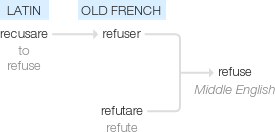Refuse
Middle English: from Old French refuser, probably an alteration of Latin recusare ‘to refuse’, influenced by refutare ‘refute’.
wiktionary
Borrowed into late Middle English from Middle French refusé, past participle of refuser(“to refuse”).
From Old French refuser, from Vulgar Latin *refusare, a blend of Classical Latin refutō and recusō.
re- + fuse
etymonline
refuse (v.)
c. 1300, "reject, spurn, decline" a request, demand, invitation, etc.; also intransitive, "to make refusal;" from Old French refuser "reject, disregard, avoid" (12c.), from Vulgar Latin *refusare, a frequentative verb from the past-participle stem of Latin refundere "give back, restore, return," literally "pour back, flow back," from re- "back" (see re-) + fundere "to pour" (from nasalized form of PIE root *gheu- "to pour").
The intransitive meaning "refuse to do something" is from late 14c.; that of "fail to comply" is from 1520s (originally of horses); that of "repudiate, disown, disavow" is attested from early 15c. but now is obsolete. Nares reports that God refuse me! was "formerly a fashionable imprecation." Related: Refused; refusing.
O Romeo, Romeo! wherefore art thou Romeo?
Deny thy father and refuse thy name;
refuse (n.)
mid-14c., "an outcast;" mid-14c., "a rejected thing, waste material, trash," from Old French refus "waste product, rubbish; refusal, denial, rejection," a back-formation from the past participle of refuser "reject, disregard, avoid" (12c.), from Vulgar Latin *refusare, frequentative form from past participle stem of Latin refundere "give back, restore, return," literally "pour back, flow back," from re- "back" (see re-) + fundere "to pour" (from nasalized form of PIE root *gheu- "to pour"). As an adjective in English from late 14c., "despised, rejected;" early 15c., "of low quality."
